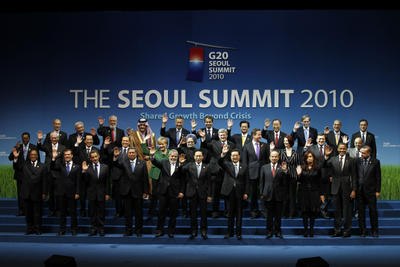The fate of Libya is still ambiguous, and the situation in Syria, as in much of the Middle East and North Africa, is escalating. The economic and political world order is an arena of power fighting: developed versus emerging and developing countries, BRICS versus G7, and even among the BRICS themselves. Meanwhile, poorer countries with small wealth-shares in the global economy remain under-represented. Global political governance is implausible, but has the time for global democracy come?
The G20 is expanding its agenda from concerns about financial, fiscal and monetary issues to include development and anti-corruption. A question has been raised regarding whether it should expand its discussions to political issues, such as UN Security Council reform and democracy. The answer is somewhat more nuanced than a blanket ‘no’. The G20 should avoid political discussions because it may undermine the global economic cooperative spirit that the G20 strives for. It would be undesirable for the next G20 meeting to go the same way as the recent OPEC talk on 8 June, which was overshadowed by political tensions between the US and oil-exporting countries like Iran and Venezuela. What the G20 should do is promote ‘global democracy’ as a part of global governance reform that is legitimate and credible.
Kaushik Basu in his most recent book, Beyond the Invisible Hand (2010), wrote: ‘political globalisation is clearly trailing behind economic globalisation’. (p.182) As a consequence, inter and intra-inequality has increased. He argued that ‘global democracy’ was needed. That is to say, national policies have cross-border impacts, both in poor and rich nations, but countries with small wealth-shares in the world economy are not fairly represented, if at all, in global institutions. The IMF, World Bank, WTO and other international financial institutions (IFIs) remain largely answerable only to industrialised nations; and many of the decision-making processes of IFIs remain opaque. The number of wars fought in the name of democracy and freedom also suggests the need for ‘global democracy’.
The world has always been in need of global democracy, but only recently has it been awoken by the voices of emerging economies, namely BRICS, including their demand for leadership of the IMF not based on nationality. Their voices were heard because of their economic power.
To promote global democracy, the G20 should strengthen the democratic structure of IFIs. The IMF quota and voice reforms, which aim to reflect shifts in the global economy, must be completed. As reiterated at the G20 London Summit in 2009, ‘the heads and senior leadership of the IFIs should be appointed using an open, transparent, and merit-based selection process’.
Financial regulatory reforms must also be pursued. The G20 should help to amend the current financial system that privatises gains and socialises losses, otherwise financial, and eventually social, stability will be at stake. Macro-prudential tools that measure the systemic risks of an individual bank, and cross-border regulatory coordination, are needed. Institutional reforms at international organisations should also include attempts to make decision making processes more transparent. We want to avoid the WTO’s ‘green room’, where the agenda was pre-set and the results pre-determined.
The G20 must continue to improve its legitimacy by reaching out to non-G20 members, and by protecting the voice of the poorest nations. In addition, it should bring to the G20 table issues related to the impacts of economic globalisation, including inequality. These are urgent matters.
President Obama, in his address to the British Houses of Parliament on 24 May 2011, stated that the rise of powers like China and India did not mean the end for American and European influence in the world. In a globalised world, all nations become one global nation, and hence fair representation of the voices of all nations — rich and poor — needs to be protected. While we try to avoid one-power dominance by a particular nation, we must also remember to avoid two-power dominance, or hegemony of a group of nations, within the global world. BRICS help strike a balance between emerging countries and the hegemony of the G7, but it must also be remembered that BRICS, or any other coalition, does not need to form a caucus, though caucusing is encouraged. The G20 should preserve this multilateralism. Now is not the time for rivalry but rather managing voices.
Maria Monica Wihardja is a researcher at the Centre for Strategic and International Studies, Jakarta, and a lecturer at the Department of Economics, University of Indonesia. An earlier version of this article was .

